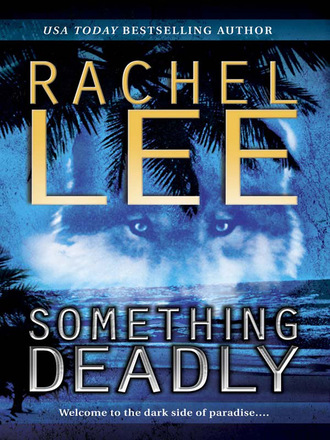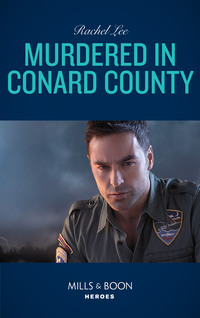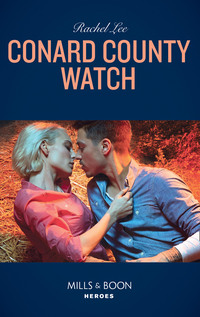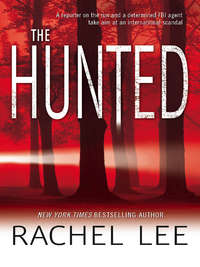
Полная версия
Something Deadly
The world was a plethora of smells: flowers, grass, trees, people, animals, insects…oh, the joy of filling his nostrils with the teeming life of the world.
But then the pungent scent of fear wafted to him. Faint, it seemed to come from elsewhere. He sucked it in, concentrating on it, following it along the sidewalk as best he could at the end of a leash. Markie was not cooperating. But then, he’d long since realized that Markie didn’t have a real nose. He sometimes pitied that little thing on her face, so useless. On the other hand, he could taste the wind for her. And her eyes and hands were far more adept than his. They worked well together.
The fear-smell went away, then returned as they rounded a corner onto his own street. He lifted his head, sucking it in, and felt his hackles stir.
Last night…last night he wasn’t sure what he had smelled. He had merely felt compelled to follow it, despite Markie’s objections. Sometimes she just didn’t know what was truly important.
But Kato found himself remembering last night, the smell he had followed, the way all the dogs around had grown frenzied, some with anger, some with fear. Not all barks were the same, though most had been protective.
Then there had been the scent. A different scent. One he had never before known. And it had led directly to death. Terror and death, two very powerful smells.
He would have left, but somehow it had seemed important to remain, to make sure his mistress knew there was danger. He hoped she had understood.
Now the lingering scent of fear led him to a palm trunk. He sniffed around it, getting glimmers of how local dogs had been doing lately. Most were happy and healthy. One or two were angry. A female was beginning to enter heat. And one… Kato sniffed the sad scent and made a whimper of sympathy.
“Kato?”
He ignored her. Moving upward, he finally zeroed in on the aroma that had called to him from so far away. Fear. Terror. Bad thing. Fresh. Recent. Large dog, healthy, but terrified.
The hair on Kato’s neck rose, and he backed away from the tree. Something was very wrong in his world. He would need Markie. And she would need him.
Declan watched the two CDC team members, fully suited, working on Carter Shippey’s remains. Remains seemed the only word for that travesty of a body on the table. But as far as Declan could see, there had been no further deterioration since this morning.
Behind him, another suited member of the team spoke. “The physical deterioration occurred overnight?”
Declan turned to face Marshall Wilcox, the team leader. “Most of it, yes. At least the part that was visible.”
“So let me see if I have this right. Last night you were called to a sudden death of a sixty-three-year-old male, retired fisherman.”
“That’s correct.”
“And you’d given him a physical only a month ago and found him to be fit?”
“As fit as a much younger man, yes.” It was unnerving talking to someone who was hiding behind a decon suit and hood, breathing his own air, a man whose voice was coming through a speaker.
“And upon examination of the body, the only unusual thing you noticed was a sponginess.”
“That’s correct. He felt doughy. But he wasn’t swollen as far as I could see. At that time his face appeared locked in a rictus of terror.”
“Not unusual with heart attack deaths.”
“No, I’ve seen it before.”
“Okay.” Wilcox came over to stand beside him. “And the way he looked when we got here was the same way he looked this morning when you pulled him for autopsy.”
“That’s correct.”
“And nobody else is sick?”
“Not yet. Not that I know of.”
“Not even his wife.”
Declan shook his head. “She called me a couple of hours ago, wanting my autopsy results.”
“And you told her?”
“That I needed to run some extensive blood work and tissue tests before I could say anything. That it might be a while before we pinpointed the exact cause of death.”
A slight movement of Wilcox’s hood seemed to indicate a nod. “Good. Well, from what I’ve seen so far, I’m going to support your quarantine of the island. In the meantime, I don’t see any need for you to hang around here.”
It was a clear dismissal. Declan felt pinpricks of anger in his face. “He’s my patient.”
“He’s our patient now,” Wilcox said flatly. “You don’t have the facilities or knowledge to handle this.”
Declan turned to face him, forcing Wilcox to do the same. “Just what is ‘this’?”
Wilcox hesitated. “I don’t know. We’ve never seen anything like it.”
The icy finger crept up Declan’s neck again. “I was afraid you were going to say that.”
“At this point, I’m not sure we even have a contagious disease,” Wilcox continued. “I can’t think of a single disease that dissolves everything in the body except the skin and nervous system.”
“Me, neither.”
“But…” Wilcox hesitated. “At this point, given the victim’s social involvement, I’d say that exposure has to have been extensive. So there’s no reason you can’t leave here and go on with life. If you really want to help…”
“I do.”
“Then you can help me with demographics. People know you and will talk to you more easily.”
Declan was only too willing to help however he could. “What do you need?”
“Start with his wife. Find out if she noticed anything at all unusual in his behavior in the past week or two. Then see if you can build us a list of everyone he routinely comes in contact with, so we can start interviewing them.”
“That’s going to be a big list.”
Wilcox nodded again. “As fast as this hit him, that gives me hope.”
“Hope?”
“You haven’t had a new case in nineteen hours. That you know of. Unless this has a long, silent incubation period, this may be the last of it. Or it might not be disease at all.”
“That’s what I’m thinking,” Declan said, for the first time admitting the nagging feeling that had troubled him all day. “The longer I sat here thinking about it, the more I began to think he had a toxic exposure of some kind.”
“That could well be. We’ll have a better idea after we complete the tests. In the meantime, Doctor, your help with demographics will be appreciated. We’re only five people.”
Declan left, stepping out into fresh air for the first time since six that morning. The tropical sunset was just beginning, a gorgeous display of reds, golds and pinks that filled the entire western sky. He filled his lungs with the soft sea air, washing away the taste of antiseptics and death that had permeated him…to his very soul, he thought unhappily.
Then, squaring his shoulders, he climbed on his Harley and rode through town toward the Shippey house. He had no doubt Marilyn was there, surrounded by friends, people who were now scared half to death because the island had been quarantined.
Marilyn was at home, but she wasn’t surrounded by friends. She was all alone, her face tear-streaked and swollen.
“Are you sure you want to come in here?” she asked him almost bitterly.
She was an attractive woman of sixty, with carefully tended, smooth skin and dark hair with a white streak. Right now she looked older than her years.
“What do you mean?”
“Oh, only that everyone is treating this house as if it were full of lepers. Nobody wants to even get close. They’ll call me, make vague remarks about helping and dropping by soon, but not a single one has showed up.”
“I’m sorry.”
She shrugged. “I thought it was a heart attack.”
He hesitated. “I don’t think so, Marilyn.”
Her face twisted; then she stepped back, inviting him in. “Want some coffee? I’ve been living on it.”
“Sure, that would be great.”
He noticed that she didn’t lead him to the living room where her husband had died last night. Instead they went into the kitchen and sat at a small dinette with mugs of coffee. Under the table, at their feet, the Shippey’s King Charles spaniel seemed to cower.
“Sorry,” Marilyn said. “He’s a mess. He misses Carter.”
Declan reached down, gently scratching the dog’s ears. “I’m sorry,” he said. Sorry for the whole mess, though there wasn’t a damn thing he could do about any of it.
“So it wasn’t a heart attack. I knew you were going to say that. The minute I heard about the quarantine, I knew it was something else. Am I going to die, too?”
She looked at him straightly, her expression seeming to say that she hoped so, because right now life was past bearing.
At this moment, he didn’t have a shred of hope to offer her. She was locked too tightly in grief and shock to respond. Without thinking, he reached out and took her hand.
Something in her eyes tightened, then relaxed. “You’re not afraid to touch me.”
“No,” he said. “I’m not.”
The tears came then, a flood of them. He held her hand, letting her squeeze his fingers until her nails dug in, and wondered what the hell was going to happen to all of them.
4
“He wasn’t sick at all,” Marilyn told Declan when her tears abated. “Just before I left for my bridge club, we were talking about taking the catamaran to Jamaica next week. He’d been looking forward to that for ages, and with Christmas vacation starting, we decided to sail around the Caribbean a bit.”
“So you didn’t notice anything amiss.”
She shook her head, her eyes filling with tears that this time didn’t fall. “I didn’t notice anything at all, Dec. Not a thing. He hasn’t been sick. He’s been eating normally. He even took a walk before dinner, like he’s always done.”
Declan nodded, gave her hand a comforting squeeze. Much as he’d been trying to hold his own feelings in abeyance since last night, they were still there, and right now his chest ached painfully for Marilyn and Cart. “Not even a sneeze or a sniffle in the last few weeks?”
She shook her head. “I’m sorry, Dec. Everything was normal. He was healthy. So unless there was something he didn’t tell me, nothing was wrong.”
Riding toward his house, Declan noticed for the first time that the streets were empty. At nine at night on these balmy tropical evenings, there were usually plenty of people out for a stroll, or sitting on their porches. Despite the advent of satellite TV, few people regularly spent their evenings in front of the tube. The weather was too nice, the beach too inviting, the shops too attractive. And being such a small community, where everyone knew everyone else by sight, evening was a time to socialize.
Square dancers met in the park; street entertainers dotted the waterfront; ice cream was hawked from shops that were little more than a counter with an open window. The place had a flavor all its own, carefully nurtured by the wealthy inhabitants to be both exotic and Caribbean in nature. Or at least what they thought of as Caribbean. Sometimes Dec felt he’d been caught up in a Disneyesque version of Key West.
But tonight even the marimba band wasn’t playing downtown. The restaurant doors were closed, a shock in itself, since the doors of all the businesses were always wide open. Every shop was closed tighter than a drum. No music spilled from bars; no one strolled the streets; no cars were parked along the narrow side streets except near dwellings.
The word of the quarantine had scared everyone. The panic he had feared had transmuted into people hiding within their closed-up houses. He was driving through a dead zone.
Shaking his head, he turned left on La Puerta, past more closed shops, heading toward his subdivision north of town and its winding, palm-lined streets. As he passed the veterinary clinic, he realized he was only a couple of blocks from Markie Cross’s home. As if the bike had a mind of its own, he found himself on the street in front of her house.
She was home. Lights were on, and as he pulled up along the curb, he saw the head of her dog silhouetted in a brightly lighted window.
Her wolf. That probably explained a lot about the critter, Declan thought as he sat on his bike, engine still rumbling, debating whether to drive on or get out and go to her door. Kato’s silent watchfulness was a whole lot more unnerving than a dog’s barking.
But the wolf had been fairly friendly to him last night, so that was certainly no reason to drive away.
Finally, not even sure why he was there, but unable to forget Markie’s smile and feeling a need for something to brighten his day, he switched off the ignition, climbed off his bike and walked to her front door. As he approached, he saw Kato’s tail wag in a distinctly friendly fashion.
Well, at least one of the residents here welcomed him. With that amused thought, he rang the doorbell.
Markie opened it a minute later, wiping her hands on a dish towel. “Dr. Quinn! What a nice surprise.” A smile spread across her face. “What’s up?”
“Not a damn thing,” he admitted.
Her smiled deepened. “Well, come on in. I’m just making dinner, and I made way too much. Stuffed mahimahi. You’re welcome to join me.”
Fish sounded good. He forced himself to remember that this was a professional visit, coupled with ordinary island hospitality. Because for some reason he wanted to read more into it.
He stepped inside and closed the door behind himself. Immediately Kato approached him, sniffing at him as if he were full of interesting information. Declan waited a few moments, then squatted down, letting the wolf continue his exploration.
“You’re good with animals,” Markie said, sounding as if that surprised her.
“Well, I figure Kato is in the driver’s seat. He’ll let me know when it’s okay to touch him.”
“Yes, he will. Most people don’t understand that. Listen, I’m going to put the mahimahi in the oven. Kitchen is straight back when you’re ready.”
“Thanks.” He smiled up at her, then returned his attention to Kato. Fascinating animal, coal-black with golden eyes. His tail was down right now, as if he were a bit uncertain, but his ears were pricked with full alertness and even a bit of caution as he sniffed the man.
Declan found himself wondering what the dog was learning. Smells of the morgue. Smells of Cart’s body or disease? He hoped not. The taco he’d had delivered for lunch, a decision he’d been regretting ever since? The scent of Marilyn Shippey. That would be fresh. The odors from his drive through town?
But Kato’s world remained beyond his reach, and Declan could only imagine what it must be like to have your most important sensory input through your nose. Did it create visions? Or just feelings? Was it pleasurable? Or merely informative?
Sphinxlike, Kato completed his examination and sat back on his narrow haunches, looking straight at Declan with those golden eyes.
“Hi, Kato.”
The tail twitched a little on the oak flooring and the ears relaxed backward a bit, not submissive, but a hint of welcome. Declan held out his hand, palm up. Kato considered it a moment, then nosed it aside.
Okay, they weren’t that far along.
Then Kato rose and trotted toward the kitchen, honoring the man by being willing to turn his back to him.
Declan straightened, accepting the honor and ignoring the way his knees—battered by too much basketball and soccer—creaked at the change in position.
The kitchen was bright, a mix of stainless steel countertops and appliances, with glass-fronted oak cabinets. The backsplash was steel, too, but the soffits over the cabinets were painted a delightful Chinese-red, bringing a huge burst of color into the nearly monochrome room.
Markie stood at an island, tossing a salad. She greeted him with another one of those smiles and said, “It won’t be long. Have a seat.”
He perched on the stool across the island from her and realized he was salivating for that salad. Physician or not, he didn’t eat nearly as well as he should, for lack of time.
“Somebody’s into cooking,” he said, indicating the kitchen, which did a fair job of impersonating a high-quality restaurant kitchen.
“Yeah.” She gave a little glance, her eyes dancing as she looked at him. With practiced ease, she sliced the fillets open and spooned in a homemade bread-crumb stuffing packed with minced sautéed zucchini, mushrooms and onions. “It’s my hobby. And my therapy. It cuts me loose after a long day at work.”
“I’m surprised you’re not too tired to bother.”
“What else would I do? Watch television?”
“You could walk on the beach.”
She laughed and put the fish in the oven, then began dicing a tomato. Her hands were nearly a blur, moving what was obviously a razor-sharp chef’s knife with a confidence that made him wince.
“That comes later. Although the longer I’m on the island, the less peaceful that becomes. It’s more like going to a huge party.”
He grinned. “Amen. The mountain can be a pretty good bolt hole, though. In the daytime, anyway.”
“I’ve been meaning to climb the volcano cone. I hear the view up there is breathtaking.”
“So is the smell of sulfur.”
She laughed again. “I still find myself wondering sometimes why I’m living at the foot of a volcano.”
“Dormant volcano,” he corrected. “It hasn’t erupted in three hundred years.”
She was a fascinating woman. He felt as if he had her full attention, even while she monitored a pot of boiling pasta and stirred a creamy white wine sauce.
“Just yesterday, in geological terms,” she retorted. Satisfied with the sauce, she turned it down to simmer, retrieved tableware and dishes, and set two places at the bar with cloth place mats and wineglasses. From the refrigerator she returned with a bottle of chardonnay and poured them each a glass.
Dec reached for his and offered a toast. “To hope.”
“To hope,” she agreed.
The wine was crisp on his tongue, and he rolled it around, savoring it.
“So,” Markie said as she began to serve salad into bowls, “what’s going on with the quarantine?”
“Maybe nothing.” Which was true.
“And maybe something?” Her eyes caught and held his, drawing him to places that seemed as haunting as her wolf’s gaze. “Something to do with Carter Shippey?”
“We don’t know what killed him. That’s all.”
Her eyes narrowed slightly, letting him know she didn’t believe that was the full story, but that for now she was going to let it pass.
“How was your day?” he asked her, seizing on any safe topic he could think of.
“The usual,” she said, as if he would know. “The same thing you do, I expect, except I do it on animals.”
A smile flickered across his face. “Dogs and cats?”
“Mostly. Today I had an iguana and a rabbit, too.”
“Your job is harder than mine. You have to know about many more species.”
She laughed. “You know, the basics are pretty much the same for mammals. I have a different slew of diseases to know, that’s all. It gets interesting with the exotics, though. Since coming here, I’ve had to do some cramming. Iguanas, turtles and snakes weren’t something I focused much on before. But if worse comes to worse, I can always call a specialist.”
“The way I do.”
Smiles again, exchanged over the wineglasses.
“I bet,” he said, “you do more sterilizations than I do.”
At that she laughed outright, her eyes dancing merrily. “By far.”
The mahimahi was just coming out of the oven when Kato suddenly appeared in the kitchen, standing at the counter and staring out the window over the sink.
“Kato, get down.”
He ignored her.
“He listens well.” The remark was offered with a laugh.
Markie rolled her eyes. “It depends. When he’s in the mood, he’s obedient. It’s just that he’s rarely in the mood. Kato, get down.”
The fish, on its baking pan, sat on the nearby stove, but the dog didn’t spare it a glance. He was intent on something out back, something in the darkness. And his tail was down.
“I hate that,” Markie sighed.
“When he doesn’t listen?”
“No, when he stares out the window like that.”
“Maybe you’re picking up on his feelings.”
“Could be.”
Then, low in Kato’s throat, a deep growl began.
Markie swung around quickly to look. The chef’s knife had returned to her hand as if by magic, seemingly without her awareness. Declan saw Kato’s hackles rise.
“There’s someone out there,” she said.
“I’ll go look.”
But her free hand shot out, gripping his forearm. “Don’t, Declan. Whatever it is, it won’t try to get past Kato. It’s probably just somebody crossing the backyards.”
The knife in her other hand belied the confidence in her eyes.
“Maybe,” Declan said. “Does he do that often?”
Her gaze wavered. “No.”
“Then maybe I should look anyway.”
“Please. Don’t bother. Whatever it is, we’re safe in here.”
He forced himself to relax onto his stool because it seemed her wish, but he looked at the dog again and didn’t at all like what he saw. Maybe that was what Markie was reacting to, the strength of Kato’s response.
The hair was raised along Kato’s entire spine. His head was lowered between his shoulders as he stared out the window, a definite don’t you dare come near me posture.
“Kato?” Markie called him again.
This time he glanced at her, his golden eyes inscrutable, a small whine coming from his throat. Then he turned back to the window.
The neighborhood erupted.
Declan had his limits, and he reached them as the barking spread like a wave through the surrounding area. Dogs did that sometimes, he knew, but rarely were so many barking at the same time, both indoors and out, and he remembered how they had done that last night, about the time that Carter Shippey had died. It made him wonder about things like poisonous gases. Surely the dogs couldn’t smell a virus?
But maybe they could. Recent studies seemed to indicate that they could smell nearly undetectable enzymes in cancer cells. Why not a marauding virus?
Leaving the delicious aromas behind, he ignored Markie’s protest and stepped out through the sliding glass door onto her patio. The night smelled the same to him as it always did, the soft scents of the sea, the greener scents of the growing things. The ceaseless breeze blew gently.
A sliver of moon rode above, and the light from street lamps helped illuminate the backyard areas of the nearby houses. There was nothing to be seen, except the tossing of palm fronds and shrubbery in the stiffening breeze…and a few dark, deeply shadowed places where nothing appeared to move.
But there was plenty to hear. The yapping and barking filled the night. This wasn’t the idle barking of canine conversation. Something was seriously disturbing the dogs.
He glanced back over his shoulder and saw Kato firmly planted at the sink, still looking out the window. Their gazes met, and there was something in Kato’s stare that made a shiver run down his own spine.
Gradually, however, the barking stopped, a wave of silence moving across the island. Then Kato dropped down out of sight. Whatever the threat had been, it was gone.
Back inside Markie’s kitchen, Declan tried to brush aside the chill that insisted on creeping up his nape. Kato certainly didn’t appear distressed anymore. He was sitting at Markie’s edge of the island, nose lifted hopefully toward the mahimahi.
“Do you feed him from the table?” Declan asked.
“Sometimes. I’m a softie.”
He managed a grin he wasn’t feeling. “Somehow I expected that.”
Markie scooped a serving of pasta into a glass bowl, then put a dinner plate upside down atop the bowl and flipped them over. She quickly spread a ring of diced tomato around the lip of the bowl, and lifted it away, leaving a perfect circle of pasta. Next she gently laid a slice of fish atop the pasta, drizzled the sauce over the fish, and finally added a few sprigs of fresh parsley as a garnish. When both plates were ready, she set them on the place mats with a flourish.












